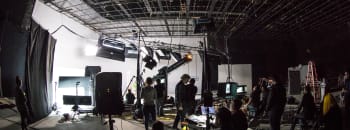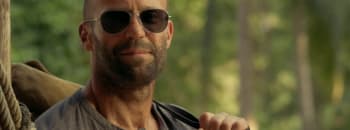Q&A with Georgette Turner, experienced location manager and line producer
Turner talks about the challenges of being a location manager as competition for filming spots hots up, including handling drastic changes, like the impact of a Queen’s funeral
By Chris Evans 27 Sep 2022

Experienced location manager and line producer, Georgette Turner, whose credits include Fantastic Beats: The Secrets of Dumbledore, The Little Mermaid and Pirates of the Caribbean, talks to KFTV Editor Chris Evans about the day-to-day work of a location manager on set in a busy film and TV industry…
What does it take to become a location manager?
I fell into it as most people do. I trained as an actress and then one day on a Woody Allen film (where I had one line), I noticed that the security were just standing around eating ice lollies. And I thought, I could do that. So I spoke to a couple of them who said the work wasn’t for women, but fortunately another forward thinking guy said he was willing to give me a try.
I then went back to work on the same film about three weeks later at a house in Holland Park where we had to just make sure that nobody parked outside during filming. However, there were lots of residents parked in the suspended bays and the tow truck turned up. I didn't have any numbers or know who to speak to, so I just started waking up all the residents to move their cars. The location manager then turned up in a panic, but saw I was drinking tea with all the neighbours and had sorted it by this point. So, he said ‘you’re coming back tomorrow’. And that was the start of my journey.
What are the key qualities of a location manager?
The biggest attribute is being able to talk to people, whether you are in a council estate or a stately home. You have to have people skills and people management skills because you are the direct link from the project to the outside world. Everybody else on the film can't really say no. There is also more structure in what they do, whereas with us, there are many factors that could change the filming process. And sometimes because of that, you are sort of the full guy of the production, because you're the one that can make things change quite rapidly because of the outside influences.
How much of the job is prep work versus being on the ground handling day to film filming requirements?
It's a lot of prep. You have to get things right, but also be willing to adapt if needed, for example with script or date changes. Schedules can be put into chaos by things like the Queen’s funeral because, of course, all the applications in Westminster will have been cancelled for health and safety issues due to the amount of people that headed into the area. There are so many potential outside factors, such as a burst gas main leading to emergency road closures, or unplanned marches that are coming through where you wanted to shoot.
There can also be other schedule disturbances like actors’ illness (especially with covid) which could lead to you loosing locations. Everything has a knock on effect.
Do you need qualifications to be a location manager or is it more about getting experience?
I have a degree in drama, which is not very helpful for the job itself, but having the performance element and people skills is helpful. My computer skills weren’t great when I started in the industry, so I had to learn all that on the job. And it's a very niche IT window we work in, the tools you use for maps, movement orders and scouting is in Excel, but it's only a very, very small amount of what we’re made to do. I have always been good at maths, and due to having ADHD I have hyperfocus when I enjoy something so that’s really helped with budgeting especially when working to tight deadlines.
How do you do your research about locations and then become established and knowledgeable about places?
You build up your own library and knowledge of where to go. You get better as you grow at learning how to scout, camera angles, shooting locations as per the script and how to present location images. I’m working across three jobs at the moment. One of them is supposed to be doubling for New York, so the obvious place to go is Liverpool because it's same period of architecture and the film office are incredibly flexible, its a very can do city. I’ve also worked on projects in council estates, like the Top Boy TV series. You quickly learn where the no go areas are. Or if you don’t handle or portray an area right there could be connotations and you won’t get the permission you need.
You get better at knowing where to go, what periods are going to work where. You learn to work within the constraints of a budget. For example, if somebody comes to me with a £5million project, and it's period, you're likely to suggest heading up north, because they probably won’t carry it off in London due to the architecture and costs of shooting in places like Westminster.
How much of the job is logistics and travel?
That’s the beauty of the job, it’s the unkown, I've started on projects that were all UK and then due to tax incentives being released flip and shoot a portion overseas. There is a lot of travel but also you can schedule things cleverly so that you can send out scouts to different destinations and coordinate from the studio, which is particularly important with a young family. Fam trips are a great thing for when you're scouting nationally. You could spot a great little place in Spain, say, and then 10 years later suggest it for a commercial.
There are also Facebook and WhatsApp groups where we location guys can reach out to each other for suggestions on locations. And you have to constantly be in touch with location libraries and councils because aesthetically things change. For example, roads that you could previously close easily suddenly become one way with all the new grid systems in London. So, there could be a perfect house that you used to film at, but now you can't because you can't close the road outside. Or the residents are having a rest period for three months, which could be the entirety of your film.
So you can't ever really rest on your laurels. You can put together a lookbook of what you think would work, but then you have to start getting out there and re photographing stuff.
Period properties obviously don’t change much, but other properties get painted, knocked down, refurbished etc. So, you can have a starting platform, but you do really need to do the round robin again.
“It is now such a thriving industry, we don't get the answers back from the libraries and councils as quickly as we used to. They get hundreds of queries a day.”
Is the process very different for public and private properties?
It depends but I have found recently you can do a lot more with the councils than with a private estate. The council wouldn't always need to see your script or they might have more flexibility in allowing you to portray different stories. Whereas with private estates, if you're doing anything potentially controversial, for example any ties to the Royal Family, you know it’s going to be tough.
There's always going to be a certain amount of locations that you can't go to because of the nature of what you're shooting. It has to be within the taste of the location.
Some properties can be very protective and there are often contractual issues to deal with. The language in these contracts isn’t always film friendly. So some of the studios and private trusts/historic monument charities have a bit of a stalemate sometimes.
Who are you dealing with mostly on a daily basis?
The industry is huge now and a lot of my job is being heavily involved with the production designer in the first instance, then the director and DoP, and of course the line producer, discussing what would happen if we change this or if we move that. So, we need lots of people on the ground and our departments are just so much bigger, because there's a lot more filming in the UK and paperwork, it all has an impact.
It's also not like you can just ring up and get into a place now. Many have their own guidelines and their own lead instructors.
So, it's much more of a business than it used to be. And because of that you need people that can work within their guidelines, whether it's drone permissions, health and safety risk assessments, there's so much more planning involved.
On my last movie, we had to put in temporary planning permission like you would if you were building a house, because that structure was going to be out of action for so long. This was huge, we needed a construction management plan and had to have the water tested and put out a notice to make sure there was no objection to the work. We actually put in the permissions before the movie was green lit to make sure we allowed ourselves enough time to have the permissions through.
Do you still love it?
Yeah, you have to. I like line producing as well, and then coming back to being a location manager because you get to be so much more creative.
“I've been on shows where I've pitched ideas before the script, so it’s not just about finding a place that looks good on camera. You can have good suggestions that end up changing the movie or the TV show, which is great.”
Is it possible to make the transition into location management from other professions or sectors of the film industry industry?
Absolutely. I'm constantly stealing people. I came into the industry not knowing anybody. But a lot of people come in because they know somebody or are in the right place. I’ve brought in coach drivers who’s now a unit manager, I have an NHS nurse as my coordinator and a retail manager as an ALM – its all about people skills and having a good eye and they are transferable from any profession.
What are you working on now?
One of the projects I'm working on is a dark drama set at the turn of the century and follows the trials and tribulations of a family. I’m currently working with a studio budgeting to see where the best place is to shoot the movie. The dollar being so strong against our pound is not great for our economy but its actually great for movie budgets as most projects are US funded.
Latest news & features
Featured profiles
Promote your services with KFTV
Choose from three profile types - Basic, Silver and Gold
Create ProfileWe offer a range of display advertising opportunities.
Learn More


